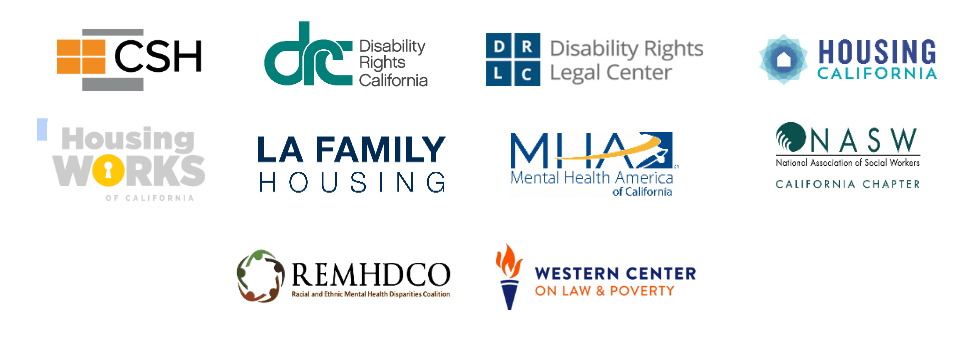California doesn’t need CARE Courts.
California needs fully-funded housing, services, and care.
SUPPORT A MORE EFFECTIVE AND EQUITABLE CHANGE
California has never provided affordable, supportive housing subsidies at scale and does not fund evidence-based services for people with significant functional limitations due to mental health disabilities. The status quo is no longer acceptable. To solve homelessness among people with mental health disabilities, we must invest in targeted, equitable housing and robust support services informed by directly impacted communities.
State-Funded Housing Subsidies + Housing Navigation Services
- Housing subsidies are the most successful model for allowing people to exit homelessness, but California does not pay for housing subsidies. Housing navigation services, like search assistance, landlord recruitment, and move-in costs, help ensure people are able to secure housing.
- Evidence overwhelmingly shows that stabilizing someone in housing with robust but voluntary support services results in better physical and mental health, decreased substance use, and housing stability. Evidence further shows people want to be housed in decent, safe permanent housing.
- In addition to subsidies to quickly and effectively house people, the State must make ongoing investments in deeply affordable housing that affirmatively furthers fair housing.
Assertive Community Treatment
- Assertive Community Treatment (ACT) is an evidence-based model providing comprehensive, community-based services to people with serious and persistent mental illness. It provides highly individualized services using a team approach, with clinical, peer, and social worker support–and without police involvement–to meet the person where they are, engage them according to their needs, and use proven interventions to plan for treatment in partnership with the consumer. ACT offers a provider-to-client ratio of 1:10. The State should fund ACT services and partner with counties to leverage Medicaid and the Mental Health Services Act and pair these services with housing subsidies.
Fully Fund Mental Health Care
- With appropriate oversight, the State can ensure that people experiencing homelessness with serious and persistent mental illness can access mental health care by accessing Medicaid funding for ACT, dedicating additional state funding for behavioral health treatment, and ensuring access to housing as a foundation from which people can most successfully access care.
Eligibility
- Eligibility for housing and services should focus on people who are (a) experiencing homelessness and (b) have a serious and persistent mental illness that limits their functioning. People could self-refer or be referred by a family member or care provider. Outreach and engagement would be robust, but participation voluntary.
We oppose the current CARE Court proposal, which fails to provide fundamental housing needs, robust supportive services, and fully-funded intensive and voluntary treatment. Additionally, it would:
- Fail to achieve the stated goal, as studies show coercive treatment is ineffective;
- Perpetuate institutional racism and worsen health disparities;
- Violate the autonomy and civil rights of people with mental health disabilities; and
- Fail to address underfunded and inaccessible housing, health, and behavioral health systems.
For more information, contact: Mari Castaldi, Housing California mcastaldi@housingca.org
This framework is supported by:

